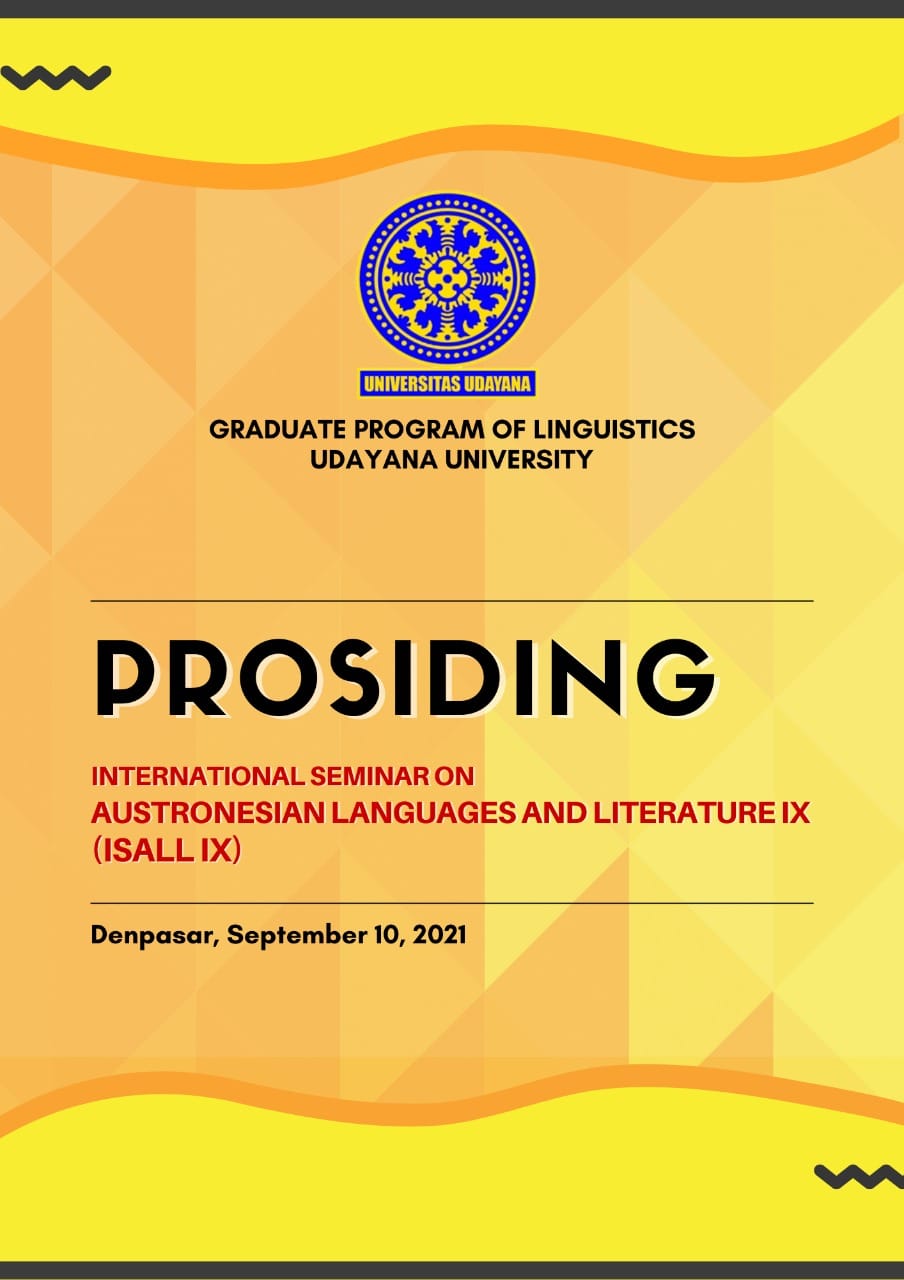Taboo Words in Manggaraian Language: Socio-Pragmatic Analysis
Abstract
Taboo words are generally recognized and spoken by speakers of any language in communication. However, taboo words richly vary in form, meaning, and use in societies in different languages. As with the case of taboo words, Manggaraian language employs some specific lexicons having different forms, meaning, reference and use among its speakers. This research aims to explore taboo words in the Manggaraian language from the socio-pragmatic analysis. The descriptive qualitative research method was applied to account for taboo words in the Manggaraian language, whereas the primary data were naturally obtained through field observation, recording, and interview. The data were descriptively analyzed through three procedures, namely: reduction, display, and conclusion drawing. The data analysis is, furthermore, based on the theories of taboo language and socio-pragmatics. The results of the study reveal that taboo words in the Manggaraian language are generally classified into profanity, obscenity, epithet, and scatology. These types of taboo words serve some functions such as expressing feeling/emotion, cursing, swearing, closeness and humor, group identity/ethnicity, and drawing attention. The matters of the taboo words refer to sex, physical appearance, animal, waste, and metaphysical things. Socio-pragmatically, the use of taboo words is considered to be a deviant behavior of social norms and impolite words for Manggaraian speakers in daily communication. Taboo words are determined by socio-cultural aspects and contexts of communication.
References
Apriani, N. W. (2017). Bentuk dan Referensi Kata Makian Dalam Bahasa Bali.
Finn, E. (2017). Swearing: The good, the bad & the ugly. ORTESOL, 34, 26.
Jay, T. (2009). The Utility and Ubiquity of Taboo Words. The Association of Psychological Science, 4(2), 153–161.
Leech, G. (2014). The pragmatics of Politeness. Oxford University.
Levinson, S. C. (1983). Pragmatics (First edition). Cambridge University.
Lidbäck, J. (2020). Functions of taboo expressions in YouTube discourse: The case of iDubbbzTV. Karlstad University.
Njoroge, R. N. (2014). Euphemisms And Taboo Words: A Case Of Kikuyu’ S Kabete Dialect. The University of Nairobi.
Pilotti, M., Almand, J., & Martinez, M. (2012). Taboo Words in Expressive Language: Do Sex and Primary Language Matter? American International Journal of Contemporary Research, 2(2), 17–26.
Putri, Derli Elsa, Sembiring, B. & I. (2019). An Analysis of Taboo Words in Rich Brian’s Song Lyrics. Journal of English Education and Teaching, 3(2), 143–155.
Ranus, M. J. G. W. (2019). Makian Dalam Bahasa Manggarai Dialek Colol Manggarai Timur. Sanata Dharma.
Rosenberg, P., & Garcia, D. (2017). The A (ffective) B (ehavioral) C (ognitive) of Taboo Words in Natural Language: The Relationship Between Taboo Words’ Intensity and Frequency. May. https://doi.org/10.1177/0261927X16660830
Samosir, Widya Nola, Meisuri & Putri, C. A. (2020). Taboo Language Expression Between Seller and Buyer In Traditional Market. Linguistica, 09(04), 396–402.
Sari, Y. P. (2020). An Analysis of Types of Taboo Words in Parker Movie. Humanis: Journal of Arts and Humanities, 24(3), 232–237. https://doi.org/https://doi.org/10.24843/JH.2020.v24.i03.p01
Sugara, Ria Dewi Hudayani and Saparianingsih, R. (2020). English Cursing Analysis of Millennial Generation in Social Media Investigate. Atlantis Press, 512(Icoflex 2019), 271–274.
Tampos-Villadolid, Marilyn & Santos, A. L. (2019). Euphemisms for Taboo Words: Ili ganon’ s Sociolinguistical Approach for Social Harmony. Journal of Education & Social Policy, 6(4), 50–57. https://doi.org/10.30845/jesp.v6n4p7
Wene, I. W., & Ena, O. T. (2020). Cursing, Sexual Harassment, Profanity, Obscenity and Epithet in Dallas Buyers Club Movie. Journal of Applied Linguistics and Literature, 5(1), 71–87. https://doi.org/http://dx.doi.org/10.33369/joall.v5i1.8920
Wibowo, R. M. (2020). Leksikon Makian Dalam Pertuturan Bahasa Indonesia: Kajian Sosio-Pragmatik. 21(2), 70–81.
Yule, G. (1996). Pragmatics. In Pragmatic. Oxford: Oxford University.


